
How Much Does a Barbell Weigh? Bar Weights Explained for Every Gym Setup
Ever load up a bar, crush your set, then wonder, “Wait… how much does a barbell weigh?” Short answer: usually 45 lbs, but it depends on the bar. Keep reading to avoid math mishaps — and check out our best-selling fixed barbells if you want consistent, no-guesswork lifting.
How Much Does a Barbell Weigh?
Typical gym bar weights — 45 lbs / 20 kg explained
Most people walk into a gym and assume every barbell weighs 45 lbs. And honestly, that’s usually true — at least for the bars sitting on a big squat rack. Those are Olympic barbells, which weigh 20 kg, or about 44 lbs.
But once you start exploring the gym, you’ll find bars that are lighter, shorter, and some that barely weigh more than your gym bag. So before you count your PRs, it’s worth knowing what you’re actually lifting.
Why barbells have different weights
Different bars exist because different lifts benefit from different designs. Some bars are built for heavy squats and pulls, others for biceps curls and accessory work.
The weight varies based on the length, steel thickness, sleeves, and intended use. So yes — asking “how much do barbells weigh?” always comes with a follow-up question: Which one?
Are all barbells 45 lbs?
Nope. Olympic bar? Usually 45 lbs.
Standard home gym bar? Could be anywhere from 15–25 lbs.
Women’s Olympic bar? 33 lbs / 15 kg.
So if you’re logging weights, remember: you always count the bar. A 135 lb squat only counts if you include that first 45.
Barbell Types & How Much They Weigh
Standard Barbell
You’ll find these in home gyms or smaller fitness studios. They’re lighter — generally 15–25 lbs — and can feel a bit flimsy when loaded heavy. Great for beginners or casual training.
Olympic Barbell
This is the beast everyone knows. 20 kg (45 lbs) for the men’s bar, 15 kg (33 lbs) for women’s. Built to handle big weights, offer a clean spin, and survive decades of deadlifts.
Trap Bar / Hex Bar
Shaped like a giant hexagon you stand inside. They usually weigh 20–25 kg (44–55 lbs). Super useful for people working around back pain, since they keep the load centered.
EZ Curl Bar
The zig-zag bar that loves your elbows. Most weigh 10–15 kg (22–33 lbs). Perfect for curls and triceps work without wrist drama.
Fixed Barbell (preloaded straight & curl bars)
You’ll see these lined up neatly on a rack. They don’t change weight — you just grab what you need. Our best-selling fixed barbells come in 20–115 lb options. Great for fast-paced workouts.
Safety Squat Bar
This one looks like a medieval tool — pads and handles included. Typically 55–65 lbs. Loved by lifters with shoulder mobility issues.
Smith Machine Bar
Looks heavy, but because of the counterbalance system, many weigh only 15–25 lbs. Always ask the gym staff or look for printed specs.
Why Bar Weight Matters for Your Training
Tracking strength progression
If you want to know whether you’re actually getting stronger, you need accurate numbers. The wrong assumed bar weight can inflate your ego… and your bench log.
Home gym vs commercial gym differences
Switching between gyms without knowing bar weight is like playing a sport but never keeping score. One minute you’re hitting PRs, the next you’re confused why everything feels impossible.
Beginners — knowing bar weight avoids guesswork
Early progress happens fast. Don’t lose that momentum by guessing what’s in your hands. The bar is your starting point — literally.
How to Check & Know Your Bar’s Actual Weight
Simple home scale method
Weigh yourself holding the bar. Weigh yourself again without it.
Difference = barbell weight.
Science.
Manufacturer labels & sleeve stamps
Quality bars often have their weight printed or stamped on the end cap. Quick and reliable.
When gym bars aren’t labeled — what to do
Ask staff. If they shrug, use the scale trick or look up the model online. Just don’t assume.
Recommended Equipment for Barbell Training
Straight Bar, Fixed Straight Bar, EZ Curl Bar
Whether you’re a home gym builder or a commercial outfitter, we’ve got every bar style you’ll ever need.
Best-selling fixed barbells — 20–115 lb
These stay ready for arm days, supersets, and fast progress. No plate changes = no excuses.
Best-selling Olympic grip plates & bumper plates — 2.5–100 lb
Match your bar with plates designed for safety and performance — especially if you lift from the floor.
Trusted brands — Body Solid, Escape Fitness, Intek Strength, TAG Fitness, TKO, Troy, USA Sports by Troy, VTX, York
The brands serious lifters and commercial gyms rely on.
Weekly 5% promos + custom bulk pricing
Looking to outfit a full gym? We’ll make sure you score the best deal possible.
Final Takeaway — Know Your Bar, Lift with Confidence
Short recap of common bar weights
-
Olympic bar: 45 lbs / 20 kg
-
Women’s Olympic bar: 33 lbs / 15 kg
-
EZ bar: 22–33 lbs
-
Fixed barbells: 20–115 lbs
-
Smith machine bar: 15–25 lbs
Why every rep should start with true numbers
You wouldn’t measure your height with a guess — treat your strength the same way. Precision matters.
Action step — check your current bar today
Before your next set, find out what your bar actually weighs. Your progress deserves accuracy.


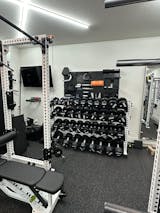


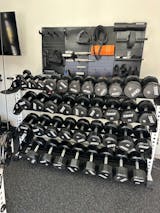
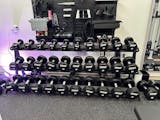
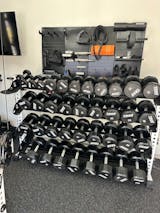
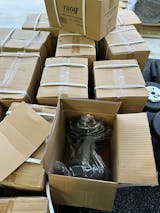

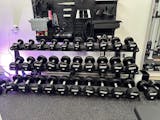

Leave a comment